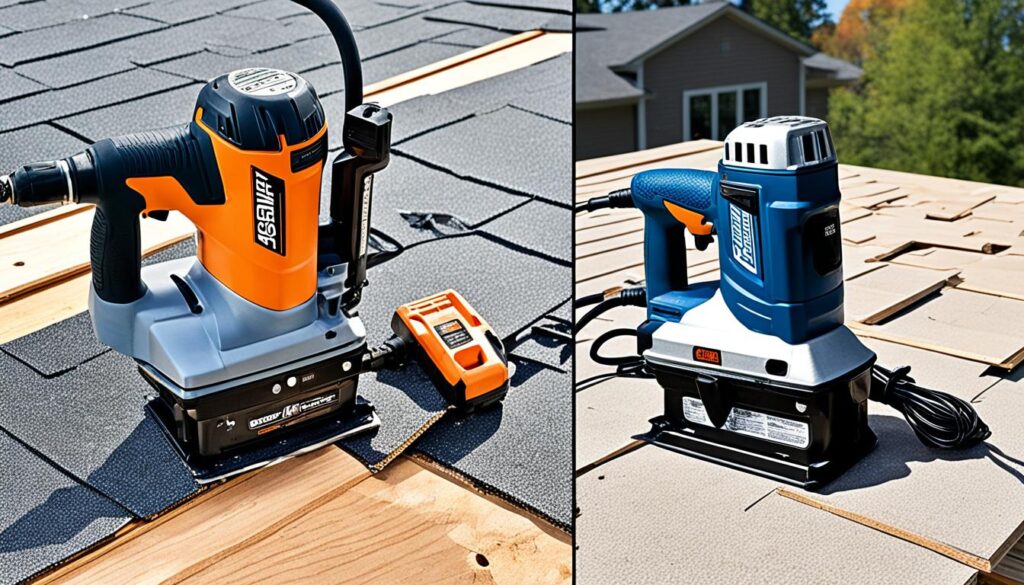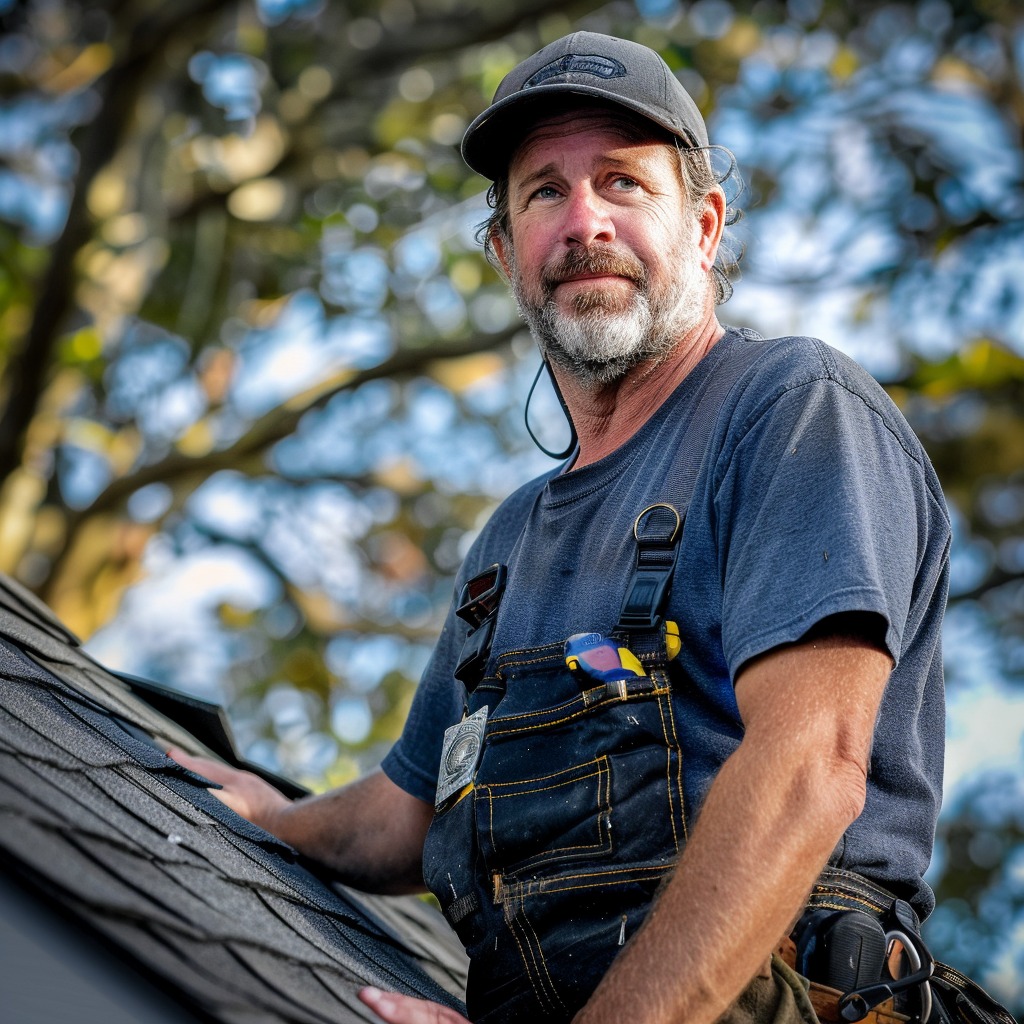
Do you know the key to a perfect roofing job? It’s not just the materials you use. The right tools, like a good nail gun, are crucial too. As a roofer, choosing the best nail gun is essential for a job that lasts. There are many options available. So, how do you pick the perfect one for you?
This guide will take you through the top roofing nail gun brands. We’ll look at what makes each brand stand out. You’ll also learn what to keep in mind when buying a nailer. We’ll talk about things like lightweight designs, strong firing power, and adjustable parts. All this info will help you upgrade your roofing skills with a smart choice.
Key Takeaways
- Find out about the best brands known for quality, durability, and how easy they are to use.
- Discover the special design elements in roofing nail guns, like comfortable handles and adjustable magazines. These aspects are made just for roofers and their specific needs.
- See why the weight, how well it’s balanced, and the ways it can fire are key decisions in buying a roofing nailer.
- Learn the pros and cons of corded and cordless nail guns. Discover how they balance power, ease of use, and how easily you can move around while working.
- Get a glimpse into the invention of nail guns. Find out how they changed the way roofs and other structures are built.
The Importance of Roofing Nail Guns
Roofing nail guns are key for pros. They speed up putting nails into shingles, underlayment, and more. These specialized tools make sure nails go in just right, keeping roofs strong.1
Specialized Tools for Roofing Professionals
Roofing nail guns are made for roofing work’s specific needs. They’re light, easy to hold, and can fit into small spaces. This makes work smoother for builders.1
Ensuring Proper Nail Depth and Material Integrity
Picking the right roofing nail gun matters for tough and lasting roofs. These tools place nails at the best depth, locking in roofing materials. This protects the whole roof.1
A Brief History of Nail Guns
The Origins of Pneumatic Tools
The idea of the nail gun started in the early 1900s. Pneumatic tools were new for work back then.2 These tools work using air that’s under pressure. The air’s power gets turned into moving parts for various jobs, like pounding in nails, cutting things, or making machines run.2 By the 1930s, people were patenting pneumatic nail guns. This was the start of a big change for how things got built.
Nail Guns Transform the Construction Industry
In the 1950s and 1960s, nail guns changed everything in construction. They let workers finish jobs quickly and well.2 Nail guns for roofing became popular. They were designed just for roofers’ needs.2
Top-rated Roofing Nail Gun Brands
In the world of roofing nail gun brands, a few names really shine. Bostitch, since 1896, is famous for user-friendly design. It makes nail reloading easy with its canisters. Hitachi, now called Metabo HPT, is all about durability. Their roofing nailers can take a beating. Dewalt, under Stanley Black & Decker, gives you many choices. They have both air powered and battery-powered models. Senco, started in 1948, focuses on how their guns feel when you use them. They’ve worked hard to make them good for roofers used to working all day.
Bostitch: User-Friendly Design and Ease of Use
Bostitch backs most nailers with a 7-year warranty.1 They’re known for making tools easy to use. Their design makes reloading nails a breeze.
Hitachi (Metabo HPT): Durability and Reliability
Hitachi nailers are covered for 5 years.1 After joining forces with Metabo HPT, their nailers got even tougher. Plus, they’re the lightest option in our top picks.3
Dewalt: Versatility and Performance
Dewalt products can have warranties from 3 years to a lifetime.1 They offer roofing nailers that work with air or without. It means you have a wide range of tools to pick from.
Senco: Stability and Control
Senco usually offers up to 5 years of warranty.1 Their focus is on how their nail guns feel in your hand. They’ve thought a lot about making them comfortable for roofers.
Key Factors to Consider When Choosing a Roofing Nailer
When looking for the best roofing nailer, remember a few things. Think about the weight. Heavy nailers tire you out quicker, but light ones might be hard to control. Most roofing nailers are under 6 pounds. Top brands like Metabo HPT, Makita, Bostitch, and DeWalt offer lighter models. This includes ones from Senco and Max too.4
Weight and Balance
Having easy-to-change settings is key. You need to adjust nail depth, air pressure, and guides without trouble. This makes your work go smoother.4 Some nailers have a bump fire mode for speed. But, beware, it might cause more jams if you’re not careful.4
Ease of Adjustment and Intuitive Controls
Look for nailers with lockout features too. These prevent firing by accident, which saves time and tool wear. Dry fire lockout is common in professional nailers. It stops the nailer from firing when there’s no nail.4 Checking all these things, plus how they fire and their power source, will guide you to the best roofing nailer for you.
Lockout Features for Efficiency
Firing Modes: Sequential-Trip vs. Contact-Trip
Roofing nail guns work in different ways. Each way has its own good points. The sequential-trip method is the safest. With this method, you need to pull the trigger first. Then, press a safety tip to shoot the nail.5 This method is great for roofers who are still learning. On the other hand, the contact-trip way is faster. But it’s not as safe. Here, you can keep the trigger pressed and touch the safety tip to shoot nails quickly.5
Safety vs. Speed
Choosing a roofing nailer means thinking about safety and speed. Contact-trip models are faster. But sequential-trip models are safer, especially for new users.6
OSHA Guidelines for Nail Gun Safety
It’s key to follow OSHA rules for nail guns. These rules help avoid accidents and keep roofers safe. They allow professionals to work well while staying safe.6
Corded vs. Cordless Roofing Nailers
Roofing nail guns come in corded (pneumatic) and cordless (battery-powered) types, each with its pros. Pneumatic nailers shine for their steady action, drawing power from an air compressor.2 Yet, they tie you down with an air hose, making them less mobile.
Cordless roofing nailers boost your freedom and ease of use by ditching the air compressor and hose.2 They let you work more flexibly. But, they might run into electric or battery problems.2 To pick between corded and cordless nailers, think about what matters most to you. Consider power, how reliable they are, and if easy moving is key.
Pneumatic Nailers: Consistency and Reliability
Pneumatic roofing nailers are loved for being steady and reliable.2 They rely on an air compressor, making sure you have a constant energy source. This is great for putting nails in roofs securely.2 Many skilled roofers pick pneumatic nailers for their unwavering results.
Cordless Nailers: Portability and Convenience
Cordless roofing nailers win in the portability and ease department, since they’re not tied to an air compressor and hose.2 These tools run on batteries, giving you more freedom to move. This is especially handy in small spots or big work areas.2 But, because they use batteries, you might face power or battery troubles. This is a trade-off many find worth it for the flexibility they offer.

Nail Capacity and Adjustable Magazines
Roofing nail guns come with magazines for 120 to 150 nails. This allows you to keep working without stopping to reload often.7 Bigger magazines mean less reloading. But, smaller ones are lighter and easier to reload. Luckily, many nailers let you adjust the magazine, fitting different nail sizes and types.7
Balancing Capacity and Ease of Reloading
Finding the right balance in nail capacity and reloading ease is key. It’s all about what you need for your job and how you like to work.7 A nailer with a big magazine needs less reloading. Yet, a smaller one might be simpler to handle and keep the tool light. Think about what you do and how you do it. This thought process will help you choose the best nail capacity. One that lets you work smoothly and comfortably.
Accommodating Various Nail Sizes and Types
Roofs need nails of different lengths because roofing materials vary in thickness. Roofing nail guns with adjustable magazines can handle nails from ¾ inch to 1¾ inches.7 This flexibility is great for roofers. It lets them choose just the right nail for the job. This ensures the roof is sound and performs well with any type of material or project.
Conclusion
Choosing the best8 roofing nail gun is key to a top-notch roof job. Leading8 names like Bostitch, Metabo HPT, Dewalt, and Senco bring features pros love. These make any roofing pro’s work more efficient and of better quality.8
Weight, balance, and how easy it is to adjust matter7. So do the firing modes and if it’s corded or not7. Think about these factors before choosing. The right tool lets you work better and safer. Plus, you’ll get amazing results on every roof you work on.
Roofing nailers handle nails from ¾ inch up to 1¾ inches7. And they can hold 120 to 150 nails7. This means pros can handle many projects without trouble. The air pressure they use goes from 70 to 120 PSI2>. This lets you work with different tasks and machines. Top brands like Metabo HPT, 3PLUS, WEN, and Bostitch meet the varied needs of roofers with their quality nailers.
Recommended

Meet William Adams, a seasoned roofing expert with over 30 years of hands-on experience in the industry. Having worked tirelessly under the scorching sun and through the fiercest storms, William brings a wealth of knowledge and expertise to the table. Hailing from the heart of the USA, he’s witnessed the evolution of roofing practices firsthand, mastering every aspect along the way. Now retired from the field, William spends his days cherishing time with his loved ones while sharing his invaluable insights through this platform. With William at the helm, you can trust that every tip, advice, and recommendation provided is backed by years of real-world experience and unwavering dedication to quality craftsmanship. Join us as we journey through the world of roofing, guided by the wisdom and passion of a true industry veteran.
